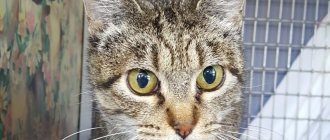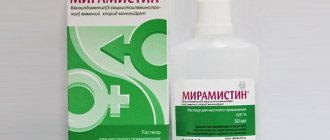Why worm a cat before vaccination?
Vaccines contain weakened pathogens that are destroyed by the animal's immune system after vaccination. Parasites weaken the body, as a result of which the viruses that enter the body grow stronger and develop.
Vaccination in this case leads to the exact opposite effect - infection of cats. This is why worms must be destroyed before vaccination.
Features of deworming kittens
The time frame for worming kittens before vaccination differs from that suitable for adult cats. If the kitten is not yet 2 months old, it is not recommended to give it parasite-killing medications. But some products can be used from the age of 3 weeks. The medicine is given only to healthy animals.
You should use medications prescribed by your veterinarian. Medicines used to treat adult cats can have a negative effect on an incompletely formed organism, causing various adverse reactions. It is recommended to use products with a broad spectrum of action.
Before vaccination, the kitten is dewormed 10 days before. If the kitten is infected, runs are carried out according to the same scheme as for adult animals.
Anthelmintics for cats before vaccination
Anthelmintics intended for cats are available in the form of tablets, suspensions, injection solutions, drops on the withers and sugar cubes.
Attention! Drugs intended for humans pose a huge danger to cats. The use of such drugs when treating a pet can lead to the development of serious health problems and cause the death of the animal.
Be sure to read:
How to deworm a cat: when to do it, how often, the best drugs and folk remedies
The most popular antihelminthic tablets are:
- Azinox (active ingredient praziquantel);
- Febtal (active substance fenbendazole);
- Alben S (active ingredient albendazole);
- Kaniverm (active ingredients fenbendozole, praziquantel, pyrantel embonate);
- Cestal Cat (active ingredients pyrantel embonate, praziquantel);
- Droncit (active substance praziquantel).
Tablet medications are given using a tablet dispenser.
The most common anthelmintic suspensions for cats are:
- Prazicide;
- Prazitel;
- Dirofen.
The basis of these drugs is praziquantel and pyrantel pamoate in various dosages.
Drops on the withers are used when it is impossible to give tablets to the animal. For this purpose, as a rule, Profender or Stronghold are used, which have a complex effect and destroy both worms and fleas. Apply such products by spreading the fur, in places inaccessible to licking by the cat (mainly between the shoulder blades).
An alternative to drops can be Ivermec injections based on ivermectin or Polyvercan sugar cubes based on niclosamide and oxybendazole, readily licked by cats (the administration of anthelmintic drugs through injections requires certain skills from animal owners).
The described drugs are used both in the treatment of helminthiasis and for the purpose of their prevention.
Attention! Kittens, like puppies, cannot be dewormed with drugs intended for adult animals. For them, specialized products containing a lower dosage of active substances are used.
How to carry out the procedure
Selected anthelmintics for dogs should be used before vaccination. This procedure is performed in several stages. The first one is considered the most important. To carry out such a manipulation, you will need saline solution, “Gamavit” or its equivalent, an absorbent. With these drugs, you can go to the veterinarian or do all the necessary steps yourself. If you have everything at hand, then it is quite possible to worm your pet with your own hands.
Related article: Should you vaccinate your pet with the Asterion vaccine for dogs?
Before giving the medicine, the dog is injected with Gamavit (an immunostimulant). If the adult dog’s pupils then dilate, drool and his gait becomes unsteady, then any absorbent should be given (for example, Enterosgel or activated carbon). For weakened animals and puppies, the absorbent must be given after about 1–1.5 hours. After 6-8 hours, the pet must empty its intestines. If this does not happen, then a laxative is administered (for example, Duphalac or Vaseline mineral oil).
The antihelminthic agent is given on an empty stomach in the morning (even if the instructions indicate that use is free of charge). The dose is calculated according to the instructions (based on the weight of the pet).
Worming should be done twice, since one manipulation does not always get rid of parasites. The fact is that it is possible to destroy mainly only adult individuals at a time.
When is deworming contraindicated?
Just like any other medications, anthelmintics have certain contraindications.
Antihelmintics should not be given to animals:
- less than 21 days old;
- expecting kittens (in the first and second third of pregnancy);
- nursing kittens (in the first three weeks after their birth);
- weighing less than 500 grams;
- weakened due to exhaustion, liver and kidney function disorders, the presence of diseases that can lead to a decrease in immunity;
- suffering from vomiting and constipation.
Attention! A prerequisite for deworming is strict adherence to the requirements specified in the instructions for the anthelmintic drug. Taking antihelminthic drugs without consulting a veterinarian is not advisable.
Be sure to read:
Worms in kittens: signs, symptoms and treatment
Purpose
Quantum is a complex drug that is recommended by veterinarians for preventive deworming, as well as treatment of the following types of helminthic infestations in cats:
- toxocariasis;
- toxascariasis;
- uncinariasis;
- echinococcosis;
- taeniasis;
- dipylidosis;
- combined invasions - with simultaneous infection by nematodes and cestodes.
A veterinary anthelmintic can be used if there are no medical contraindications and the type of parasite is unknown. The drug is used for preventive and therapeutic purposes:
- for regular deworming (veterinarians recommend doing it every three months);
- when preparing for vaccination - 7-10 days before vaccination;
- for the treatment of helminthic infestations - when larvae or adults are observed in the cat’s feces, as well as if characteristic signs of infection are present.
Helminthiasis can be suspected based on the following characteristic signs:
- weight loss;
- decreased appetite;
- diarrhea or constipation;
- bloated stomach;
- kittens have retarded growth and development;
- weakness, fatigue;
- pallor of the mucous membranes of the sclera.
In case of severe infections, bloody stools and vomiting may be observed, in which fragments or whole worms may be observed in the vomit; in severe cases, the animal may experience convulsions and paralysis of the hind legs.
Why is infection with worms dangerous?
Worms weaken the animal's body. Moving throughout the body, they can affect not only the intestines, but also the liver, kidneys, and some types of helminths affect the heart (so-called heartworms). Their presence in a cat’s body can lead to disruption of the integrity of organs (liver passages, intestinal walls, blood vessels, etc.). Worms can cause serious infectious diseases.
Some types of parasites can also infect humans. Roundworm Toxocara cati is dangerous with unpleasant consequences, including blindness. Hookworms can enter the human intestine, causing eosinophilic enterocolitis. When they penetrate a person's lungs, they cause Loeffler's syndrome, accompanied by coughing and wheezing. In severe cases, iron deficiency anemia develops.
Helminth infections are dangerous for adult cats, and especially for kittens. If the infection is severe, the body becomes intoxicated with waste products of the parasites, and the animal may develop anemia. In weakened, emaciated animals, the presence of a large number of worms in the body can lead to necrosis of organs and tissues and death.
Even a pet that never leaves the apartment can become infected with helminths. Animals that are fed by their owners with natural unprocessed products - river fish, raw meat - are at risk. The carriers of worm eggs are not only insects - mosquitoes, fleas and midges, but also people - on their clothes and shoes.
The most effective anthelmintic drugs
The medicine that needs to be used to worm the cat before vaccination is selected by the veterinarian. The drugs have similar effects, the effect is no different; the choice is made based on the active substance that is best suited to the individual case and the price.
Drontal tablets help a lot. Produced in the form of a suspension, the Parasiticide can be used to treat not only adult animals, but also young ones. Cats often willingly eat Cestal tablets themselves, since the medicine has a strong liver odor. Milbemax can be given from 1.5 months; This remedy copes not only with adult helminths, but also with their eggs. Pyrantel does not help against all types of helminths; it can be used to treat kittens, since it is mildly toxic.
Vaccination dates
At the beginning of their life, kittens have passive immunity received from their mother, so they are not vaccinated during the first months. At the age of 12 weeks, the kitten must receive its first course of rabies vaccination. Unlike other standard vaccinations for cats, the rabies drug is administered once, without a second dose after a month . Revaccination should be carried out regularly throughout the life of the animal: at the age of 1 year, and then once every one or three years (depending on the conditions of detention and the vaccine).











